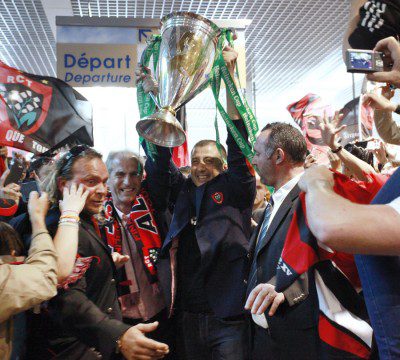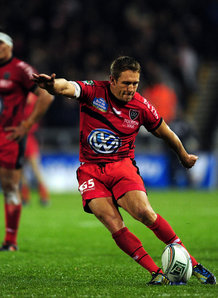
TOULON, FRANCE – Not content with their European title, Toulon want to rule the world. Last year, the French squad triumphed in the Heineken Cup thanks to Johnny Wilkinson’s boot, some quality play from both the forwards and the backs, and a healthy cash infusion from club president Mourad Boudjellal. Now, Boudjellal is proposing ambitious plans to bring together the winners of the Northern Hemisphere’s premiere club competition with the winner of the Super XV championship for a “World Cup of Clubs.”
Before the dream is to become reality, though, several hurdles must be cleared – not least of which is the stubbornness and short-sightedness of European Rugby Cup Ltd, the organizers of the Heineken Cup. ERC President Jean-Pierre Lux, has expressed adamant opposition to the plan, stating “under the terms of the European Rugby Cup participation agreement that they signed before the competition, the clubs [here meaning Toulon] do not have the right to play such a game as European champions especially against the winners of the Super 15, it is stated in the agreement.”
Such may be the letter of the law. Yet, the fact that such a clause was included in the mandatory agreement is extremely troubling. The goal of the ERC, whose very existence is in question beyond next year, due to the RFU and Top 14’s determination to ensure more equitable treatment in European competition, should be two-fold:
Promote the game.
Ensure the financial well-being of clubs under their auspices.
The proposed World Cup of Clubs would undoubtedly achieve both goals. But the ERC seems more concerned with getting their slice of the pie than the larger good of the game itself. The television rights for such a competition would presumably not include the ERC, which is surely a basis for the organizer’s objections to the match.

Regardless of what party is making money directly from the match, the World Cup of Clubs has the chance to benefit the entirety of the sport. It would raise the stakes in the Heineken Cup Final – as though they were not high enough already – while potentially increasing fan interest in European club rugby’s most important match of the year. Staging the match in a neutral venue (Japan, for instance, has successfully hosted a Bledisloe Cup fixture in the past) would give the game a further chance to extend its global reach, a crucial goal in the lead-up to the 2019 World Cup, which will take place in a “Tier 2” nation for the first time.
While the insanely crowded fixture calendar of international-quality players is a legitimate concern when addressing the creation of this new competition, determined parties would surely find a weekend that works for both sides involved. It appears unlikely that the dreamed-of match will take place before the calendar re-alignment in 2016. Even this assessment assumes that re-alignment will take place, though if past relations between the IRB, SANZAR, the ERC, and various other national organizations are anything to judge by, this may be an optimistic view.
The sport is quickly reaching a tipping point. Either outdated and increasingly out-of-touch organizations like the ERC can cling to their power, denying the sport the opportunity to expand its reach or they can adapt and take advantage of the opportunities provided by an progressively global market for the game. Here’s hoping they choose the latter option, and approve the World Cup of Clubs.

